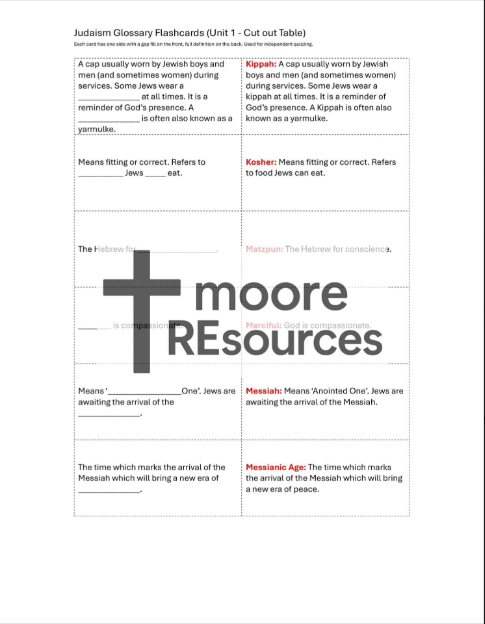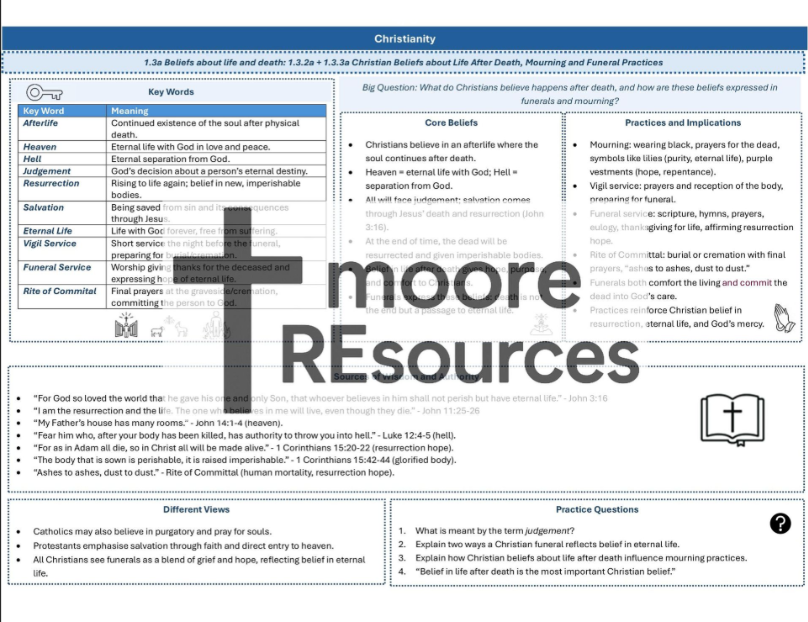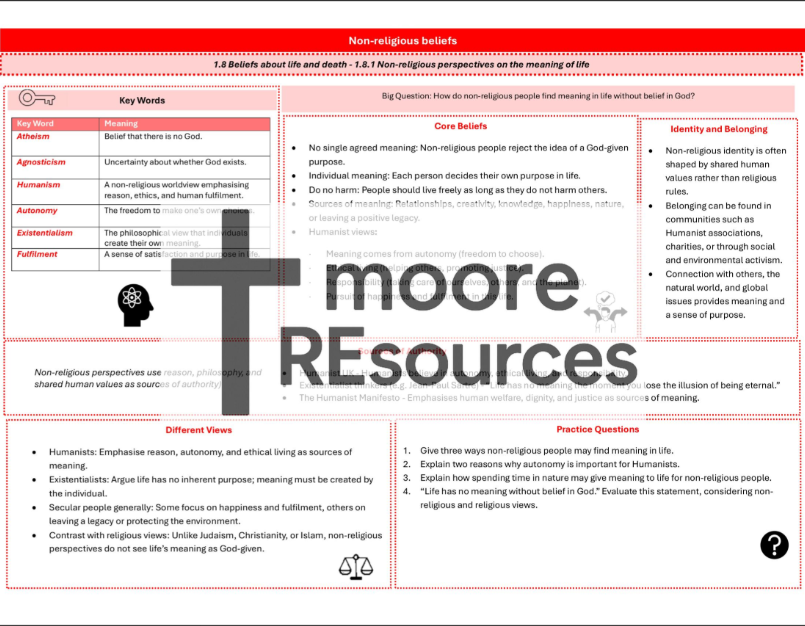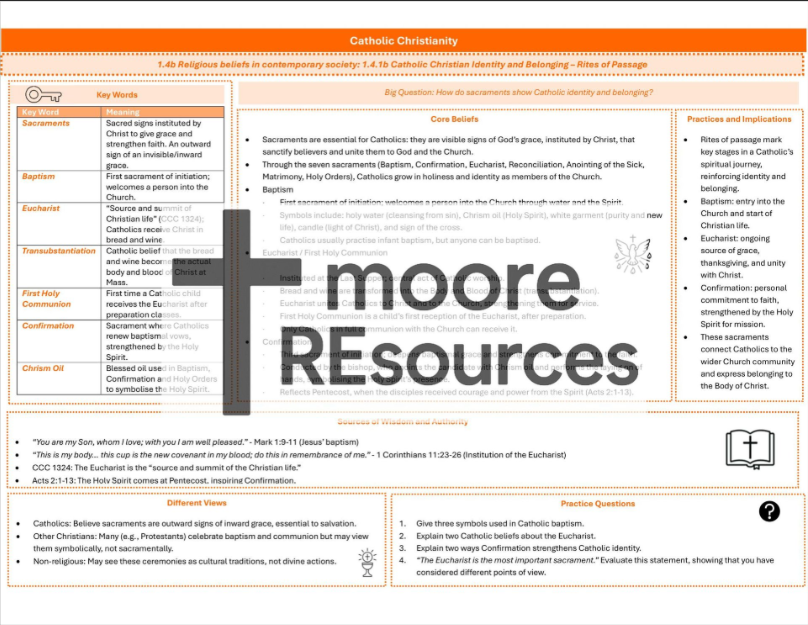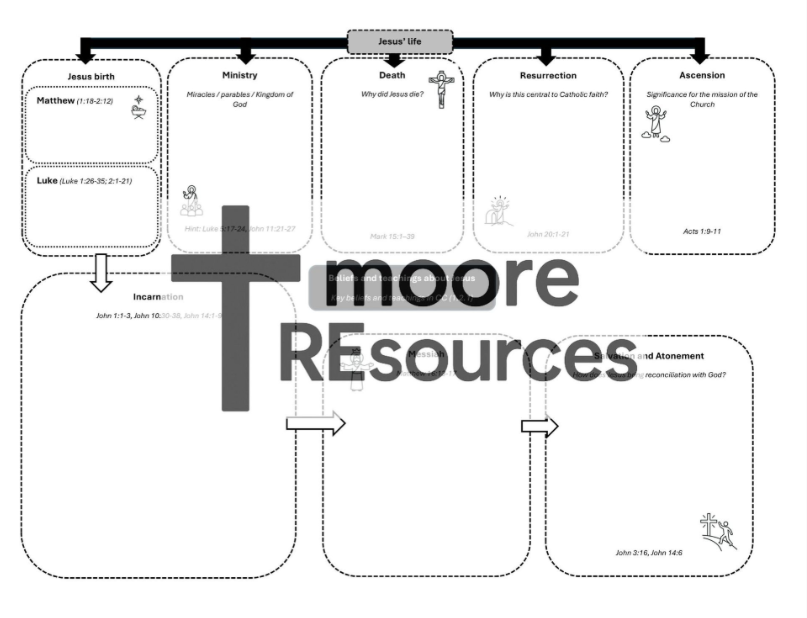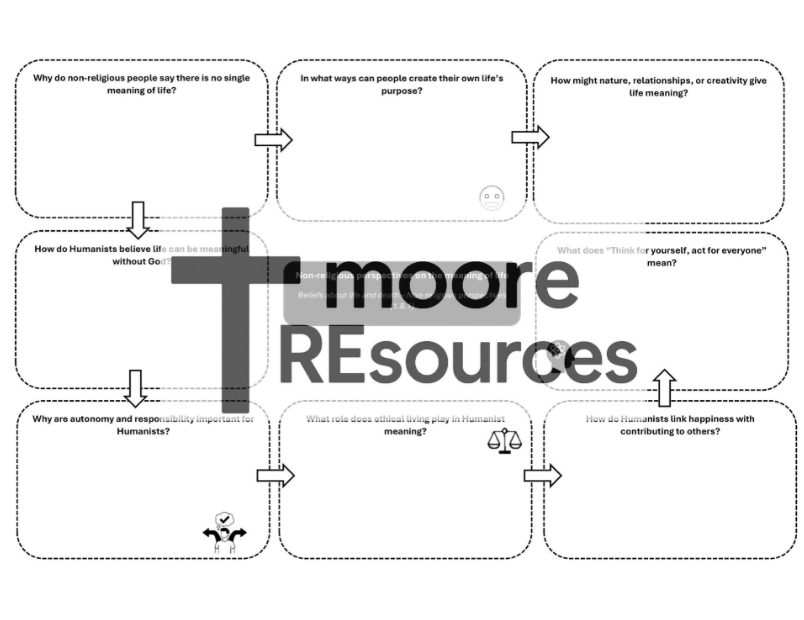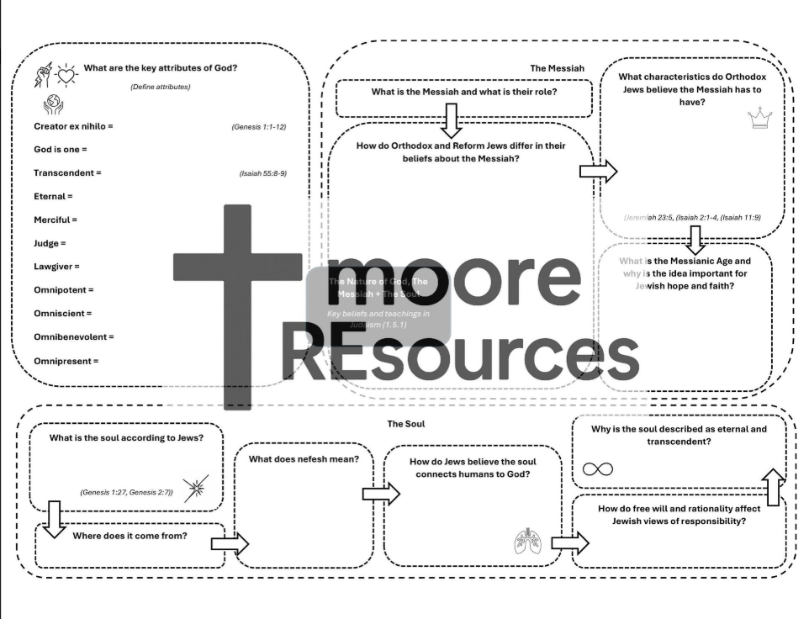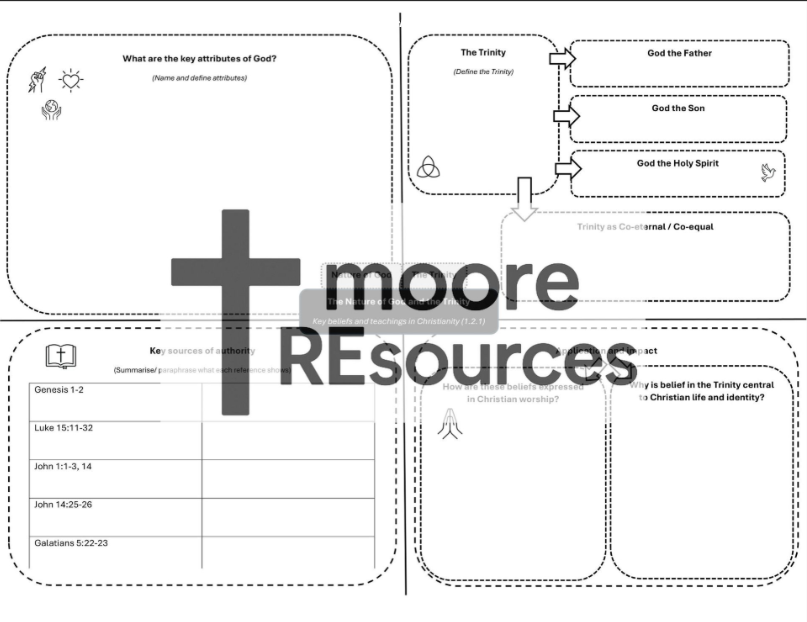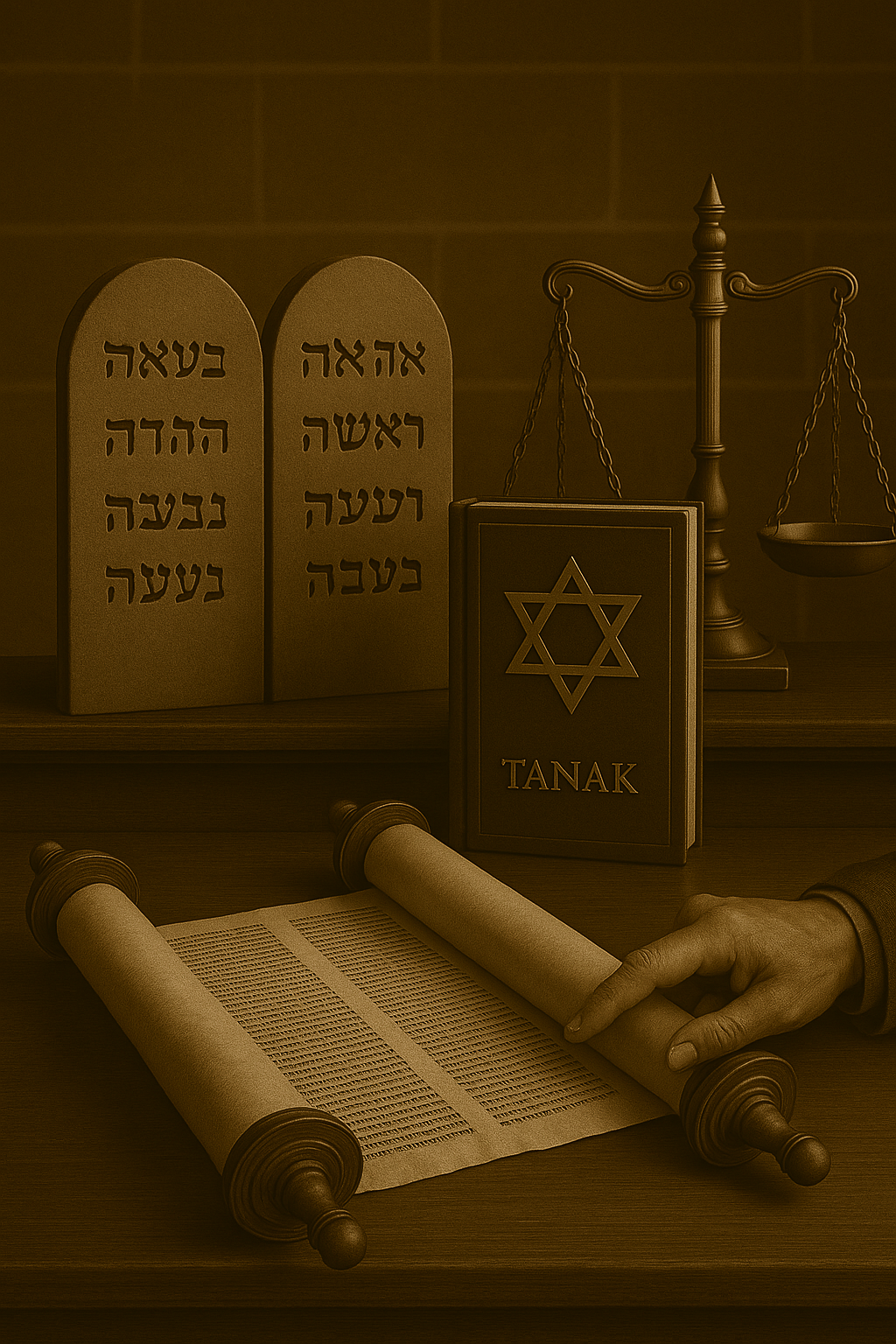 Image 1 of 7
Image 1 of 7

 Image 2 of 7
Image 2 of 7

 Image 3 of 7
Image 3 of 7

 Image 4 of 7
Image 4 of 7

 Image 5 of 7
Image 5 of 7

 Image 6 of 7
Image 6 of 7

 Image 7 of 7
Image 7 of 7








Unit 1 - Judaism Bundle
USE CODE BUNDLE10 FOR £10 OFF WHEN YOU BUY TWO BUNDLES
Bring Jewish belief, identity, and ethical action to life in your classroom with this comprehensive and inspiring Bundle Pack for Units 1.5d to 1.7d: Judaism. Carefully aligned to the WJEC Religious Studies 2025 specification, this complete set guides learners through foundational Jewish doctrines, beliefs about life and death, communal practices, and moral reasoning. Designed to develop deep understanding, foster critical reflection, and build exam confidence.
Learners Will Understand:
1.5.1d Key Beliefs and Teachings in Judaism
The nature of God: Creator, One, transcendent, merciful, judge, law-giver, and all-powerful.
Beliefs about the Messiah and Messianic Age (Olam ha-ba), including differences between Orthodox and Reform views.
Teachings about the soul (nefesh) as divine and eternal, created in God’s image.
The importance of covenants: Abrahamic (identity, circumcision, Promised Land) and Mosaic (law and commandments).
The Shema as a central declaration of faith.
The role of sacred texts (Torah, Tenakh, Talmud) in daily life.
1.5.2d Jewish Belief in Action
Gemilut Hasadim: acts of loving kindness reflecting God’s compassion
Helping the poor and needy as a divine command
Tikkun Olam: repairing the world through social justice and community care.
Contemporary examples of Jewish faith-based activism.
The aims and activities of Mitzvah Day as a modern expression of Jewish values.
1.6.1d Meaning of Life in Judaism
Living in accordance with the covenant and observing mitzvot.
Pursuing justice, compassion, lifelong learning, and strong community and family ties.
1.6.2d Jewish Beliefs About Life and Death
Beliefs about the afterlife: Gan Eden, Gehenna, resurrection (bodily and spiritual), Olam Ha-Ba, and Sheol.
The link between earthly life and eternal accountability.
1.6.3d Jewish Practices Around Death
Importance of mourning and funeral rituals in expressing faith and community belonging.
Mourning practices: aninut, shiva, shloshim, yarzheit.
Funeral practices: taharah, the funeral service, and symbols of commitment and remembrance.
1.7.1d Jewish Identity, Belonging, and Practices
The importance of belonging to a worshipping community and sharing purpose.
Expressing identity through pilgrimage (Western Wall, Yad Vashem) and symbolic actions (kippah, tallit, tefillin, kosher food).
The role of community and tradition in strengthening personal and collective Jewish identity.
1.7.2d Judaism and Morality
Making moral decisions through divine commands (Ten Commandments, 613 mitzvot), conscience (matzpun), and ethical teachings.
Understanding good and evil inclinations (yetzer ha tov and yetzer hara) and exercising free will.
Beliefs about divine judgement in the afterlife
Suitable for:
WJEC GCSE Religious Studies (from 2025)
KS4 general RE modules
Ethics, philosophy, and PSHE crossover lessons
Revision, enrichment, or thematic study sessions
USE CODE BUNDLE10 FOR £10 OFF WHEN YOU BUY TWO BUNDLES
Bring Jewish belief, identity, and ethical action to life in your classroom with this comprehensive and inspiring Bundle Pack for Units 1.5d to 1.7d: Judaism. Carefully aligned to the WJEC Religious Studies 2025 specification, this complete set guides learners through foundational Jewish doctrines, beliefs about life and death, communal practices, and moral reasoning. Designed to develop deep understanding, foster critical reflection, and build exam confidence.
Learners Will Understand:
1.5.1d Key Beliefs and Teachings in Judaism
The nature of God: Creator, One, transcendent, merciful, judge, law-giver, and all-powerful.
Beliefs about the Messiah and Messianic Age (Olam ha-ba), including differences between Orthodox and Reform views.
Teachings about the soul (nefesh) as divine and eternal, created in God’s image.
The importance of covenants: Abrahamic (identity, circumcision, Promised Land) and Mosaic (law and commandments).
The Shema as a central declaration of faith.
The role of sacred texts (Torah, Tenakh, Talmud) in daily life.
1.5.2d Jewish Belief in Action
Gemilut Hasadim: acts of loving kindness reflecting God’s compassion
Helping the poor and needy as a divine command
Tikkun Olam: repairing the world through social justice and community care.
Contemporary examples of Jewish faith-based activism.
The aims and activities of Mitzvah Day as a modern expression of Jewish values.
1.6.1d Meaning of Life in Judaism
Living in accordance with the covenant and observing mitzvot.
Pursuing justice, compassion, lifelong learning, and strong community and family ties.
1.6.2d Jewish Beliefs About Life and Death
Beliefs about the afterlife: Gan Eden, Gehenna, resurrection (bodily and spiritual), Olam Ha-Ba, and Sheol.
The link between earthly life and eternal accountability.
1.6.3d Jewish Practices Around Death
Importance of mourning and funeral rituals in expressing faith and community belonging.
Mourning practices: aninut, shiva, shloshim, yarzheit.
Funeral practices: taharah, the funeral service, and symbols of commitment and remembrance.
1.7.1d Jewish Identity, Belonging, and Practices
The importance of belonging to a worshipping community and sharing purpose.
Expressing identity through pilgrimage (Western Wall, Yad Vashem) and symbolic actions (kippah, tallit, tefillin, kosher food).
The role of community and tradition in strengthening personal and collective Jewish identity.
1.7.2d Judaism and Morality
Making moral decisions through divine commands (Ten Commandments, 613 mitzvot), conscience (matzpun), and ethical teachings.
Understanding good and evil inclinations (yetzer ha tov and yetzer hara) and exercising free will.
Beliefs about divine judgement in the afterlife
Suitable for:
WJEC GCSE Religious Studies (from 2025)
KS4 general RE modules
Ethics, philosophy, and PSHE crossover lessons
Revision, enrichment, or thematic study sessions


